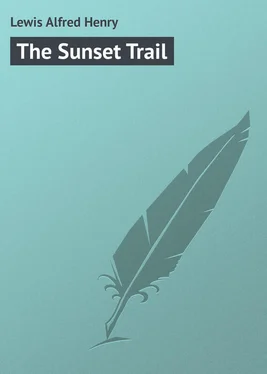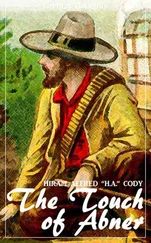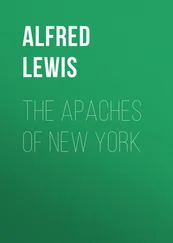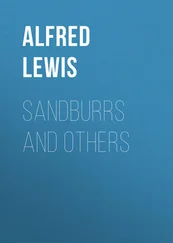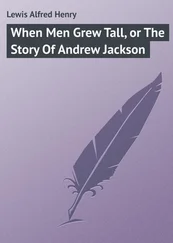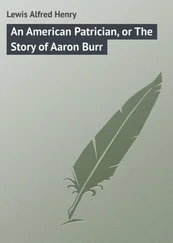Alfred Lewis - The Sunset Trail
Здесь есть возможность читать онлайн «Alfred Lewis - The Sunset Trail» — ознакомительный отрывок электронной книги совершенно бесплатно, а после прочтения отрывка купить полную версию. В некоторых случаях можно слушать аудио, скачать через торрент в формате fb2 и присутствует краткое содержание. Жанр: foreign_prose, foreign_adventure, на английском языке. Описание произведения, (предисловие) а так же отзывы посетителей доступны на портале библиотеки ЛибКат.
- Название:The Sunset Trail
- Автор:
- Жанр:
- Год:неизвестен
- ISBN:нет данных
- Рейтинг книги:5 / 5. Голосов: 1
-
Избранное:Добавить в избранное
- Отзывы:
-
Ваша оценка:
- 100
- 1
- 2
- 3
- 4
- 5
The Sunset Trail: краткое содержание, описание и аннотация
Предлагаем к чтению аннотацию, описание, краткое содержание или предисловие (зависит от того, что написал сам автор книги «The Sunset Trail»). Если вы не нашли необходимую информацию о книге — напишите в комментариях, мы постараемся отыскать её.
The Sunset Trail — читать онлайн ознакомительный отрывок
Ниже представлен текст книги, разбитый по страницам. Система сохранения места последней прочитанной страницы, позволяет с удобством читать онлайн бесплатно книгу «The Sunset Trail», без необходимости каждый раз заново искать на чём Вы остановились. Поставьте закладку, и сможете в любой момент перейти на страницу, на которой закончили чтение.
Интервал:
Закладка:
Scattered along the north bank of the Cimarron, a straggling mile or more, stood the tepees of Bear Shield’s people. It was well beyond midnight, and nothing vocal about the camp save the occasional short yelp of a dog, made melancholy by the hour’s lonesomeness. Now and then an ember of some dying fire burned for a fierce moment, and then blinked out. Mr. Masterson, riding slowly down the opposite bank, and taking shrewd care to keep deep within the shadow of the woods, counted seventy-two lodges – a probable population of seven hundred and twenty, for a plainsman’s census argues ten to a lodge.
Mr. Masterson had located the band of ponies, which made up the riches of Bear Shield, late in the dull gray afternoon, while he lay hidden in a dry arroyo. As it grew darker, he had crept nearer, keeping ever the location of the ponies which, in a rambling, ragged herd, were grazing up the wind. Mr. Masterson, on the south bank of the Cimarron, was heedfully to leeward of the herd; a proper piece of caution, for an Indian pony, at the earliest paleface taint to alarm the breeze, will scream like a wronged panther.
Arriving at the place where he meant to ford the river and begin his drive, Mr. Masterson halted for a cloud of unusual size and thickness to blanket the blurred radiance of the dwindling moon. Such a cloud was on its way; from where it hung curtain-wise on the horizon it should take ten minutes before its eclipse of the interfering moon began.
While he waited Mr. Masterson removed his sombrero and fastened it back of the cantle by a saddle-string. Also, he unstrapped his blanket and wrapped it about his shoulders, for it was part of Mr. Masterson’s strategy to play the Cheyenne for this raid. It was among the chances that he would run across an Indian herder or meet with some belated savage coming into camp. The latter was not likely, however, since the last journey an Indian will make is a night journey. The night is sacred to spirits, and he hesitates to violate it by being abroad; in the day the spirits sleep.
While Mr. Masterson waited deep beneath the cottonwoods, a splash from the river’s brink would now and again show where the bank was caving, or the crackling of branches, and the profound flapping of great wings overhead, mark how some wild turkey – a heavy old gobbler, probably – had broken down a bough with sheer stress of fat, and was saving himself from a fall. Far away could be heard the faltering cry of a coyote, bewailing a jackrabbit which he had not caught.
That thick cloud, waited for, began to encroach on the moon, and Mr. Masterson, his pony stepping as though walking on a world of eggs, headed for the river. The place had been well considered; there was no tall bank off which to plump, but instead a gradual sandy descent.
The pony walked into the water as silently as a ghost. The current rippled and rose in petulant chuckles of protest about the pony’s legs; but, since its deepest was no more than to the hocks, Mr. Masterson honoured it with scant attention.
Among Bear Shield’s ponies was a giant mule, renegade and runaway from some government train. This long-eared traitor remembered his days of burden, and the thing to please him least was the sight or sound or scent of a paleface. The paleface was the symbol of thralldom and sore stripes, and the old bellsharp desired none of his company.
By stress of brain, which counts among mules as among men, the old bellsharp had risen to the rank of herd leader, and the Bear Shield ponies would drill and wheel and go charging off at his signal. As Mr. Masterson and his pony scrambled up the bank a flaw in the wind befell, and a horrifying whiff of the stealthy invader reached the old bellsharp. Thereupon, he lifted up his voice in clangorous condemnation, after the manner of his species. The harsh cry echoed up and down the slumbrous Cimarron like an outcry of destruction.
With that cry for his cue, Mr. Masterson drove home the spurs and began a rapid round-up of the startled ponies. At the warning call of the old bellsharp, the herd members came rushing towards him. Placing himself at their head, his “hee-haw” of alarm still ringing like a bugle, he bore them away at a thunderous gallop for the tepees.
Hard at the hocks of the flying battalion came Mr. Masterson. The outfit swept through Bear Shield’s village for its entire length, Mr. Masterson lying low along his pony’s neck and letting his blanket flap in the wind bravely, for purposes of deception. After the ponies, charged Mr. Masterson; after Mr. Masterson, charged a riotous brigade of dogs; the uproar might have been heard as far as Crooked Creek.
As the mad stampede swept on, ever and anon a pony more blind or more clumsy than his fellows would bump into a lodge. At that, an indignant Cheyenne would tear aside the lodge-flap, protrude his outraged head, and curse the ponies aboriginally. Observing the blanketed Mr. Masterson, the savage would go back to bed, gratefully taking him for some public-spirited neighbour who was striving to return the ponies to their grazing ground and inspire them with normal peace.
The flying ponies – the vociferous old bellsharp having fallen to the rear, through lack of speed – wheeled against a thick clump of cottonwood, and then broke north into the open. Their fever of fear was subsiding, they were taking a more modest pace, and Mr. Masterson began turning in the corners, and closing up the flanks, of the retreating band. He made no effort to crowd or press, but gave them every encouragement to regain their confidence, and moderate their flight. Presently the herd was jogging comfortably; and because the wind was in their faces they were furnished no disquieting notice of Mr. Masterson’s paleface identity through the medium of their noses.
The ponies had traveled twenty minutes, and were cleverly bunched, when Mr. Masterson made a discovery. Off to the right in the dull half-dark he beheld a figure, blanketed, mounted, riding like the wind, and busy with the stragglers as they pointed out of the herd. Like a flash, Mr. Masterson whipped his rifle from its scabbard. Throwing the blanket aside, to free his hands and arms, he fell a trifle to the rear, and began edging towards the stranger.
From his riding, and because he seemed so willingly bent on sending the ponies northward, Mr. Masterson felt assured that the stranger was a white man. The expiring moon threw a last parallel ray along the surface of the plains, and Mr. Masterson saw that the stranger’s pony was a chestnut. Also it had the hard and bitter gait of Alazan, the bronco wherewith he had equipped Cimarron Bill when that lost one issued south from Dodge to his wiping out.
Mr. Masterson drew nearer; of a truth the jolty pony was Alazan! Who then was the stranger? Could he, by some miracle of heaven, be Cimarron Bill? Mr. Masterson gave a curlew’s whistle, which had been a signal between him and Cimarron Bill. At the sound the stranger wheeled upon him.
Mr. Masterson pulled up his pony; the sharp cluck! cluck! of the buffalo gun clipped the night air as he cocked it, for Mr. Masterson was a prudent man. The stranger, sitting fearlessly straight in his stirrups, bore down upon him with speed. Mr. Masterson watched him with the narrowed gaze of a lynx; as much as he might tell in the night, there was no weapon in the stranger’s hands.
“Howdy, Bat!” cried the stranger, as he came up with a great rush. “I’ve knowed you for an hour.”
Then Mr. Masterson let down the hammer of his Sharp’s, slammed it back in its scabbard beneath his saddle-flap, and taking the stranger in a bear-hug, fairly tore him from the saddle. The stranger was Cimarron Bill; and in his youth Mr. Masterson was sentimental.
“Where have you been these weeks?” cried Mr. Masterson.
“I’ll tell you later,” returned Cimarron Bill. “We’d better clot up these ponies an’ begin the drive, or they’ll get our wind an’ stampede for B’ar Shield’s village.”
Читать дальшеИнтервал:
Закладка:
Похожие книги на «The Sunset Trail»
Представляем Вашему вниманию похожие книги на «The Sunset Trail» списком для выбора. Мы отобрали схожую по названию и смыслу литературу в надежде предоставить читателям больше вариантов отыскать новые, интересные, ещё непрочитанные произведения.
Обсуждение, отзывы о книге «The Sunset Trail» и просто собственные мнения читателей. Оставьте ваши комментарии, напишите, что Вы думаете о произведении, его смысле или главных героях. Укажите что конкретно понравилось, а что нет, и почему Вы так считаете.
